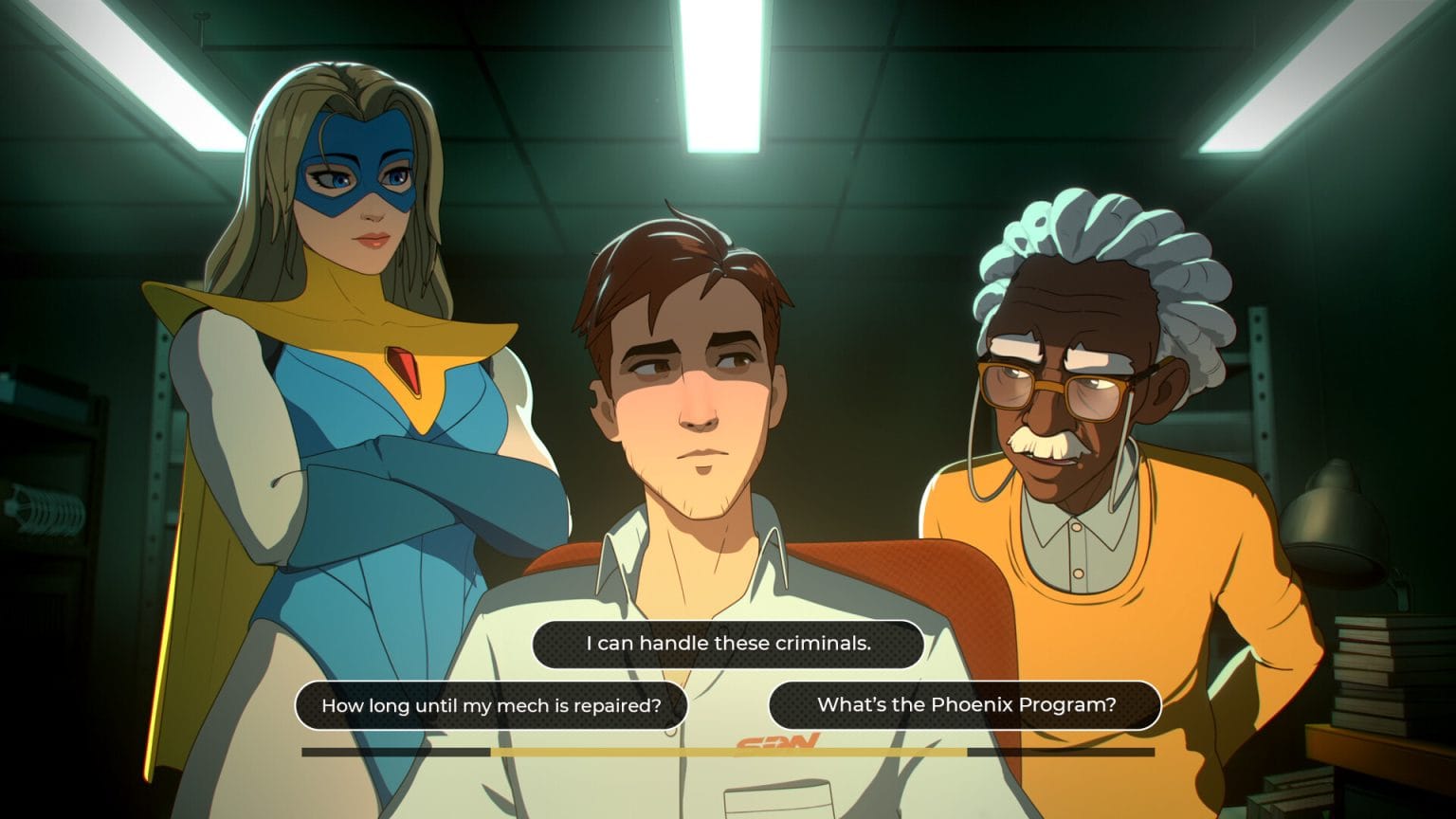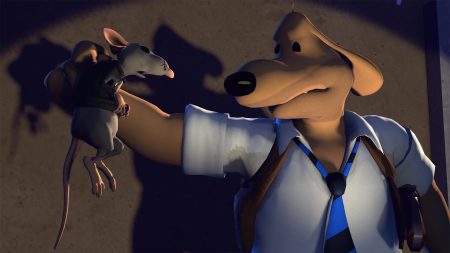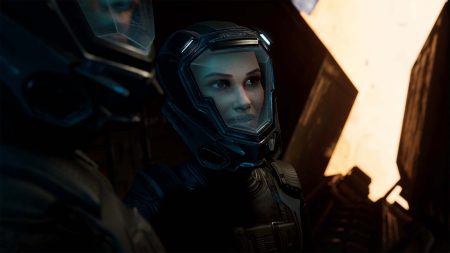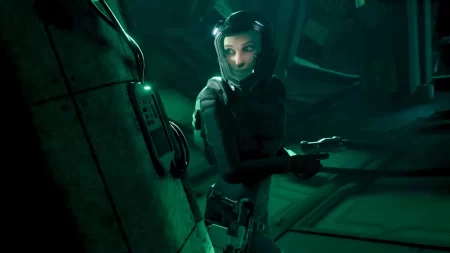Dispatch is an episodic, narrative-focused choose-your-own-adventure style game, and the first release from AdHoc Studio, a development joint composed of former Telltale Games staff. While sticking the landing is a crucial element of any narrative venture, the star-studded voice cast and sharp writing of Dispatch showcase a very promising start — one that harbors a return to form for a genre whose best days once might have seemed long past.
Dispatch first made waves at the 2024 Game Awards with the announcement of a prolific voice cast pulling from many areas of entertainment. The game’s talent included established voice acting heavyweights such as Laura Bailey, Matthew Mercer, and Travis Willingham of Critical Role fame; streamers MoistCr1TiKaL and jacksepticeye; musicians THOT SQUAD and Yung Gravy; and even acclaimed live-action stars Aaron Paul and Jeffrey Wright, among others.
Described as a superhero workplace comedy, Dispatch is a new IP that requires no priors, other than perhaps a working understanding of modern superhero dynamics. Basically, if you’ve seen a Marvel or DC film in the past two decades, you’ll be right at home. However, a referential love-letter to existing properties this is not — Dispatch is wholly its own unique entity. With witty quips, sharp writing, and standout characters, the first two episodes of Dispatch serve as an enticing appetizer for future episodes (eight are planned in total) to come.
With witty quips, sharp writing, and standout characters, the first two episodes of Dispatch serve as an enticing appetizer for future episodes to come.
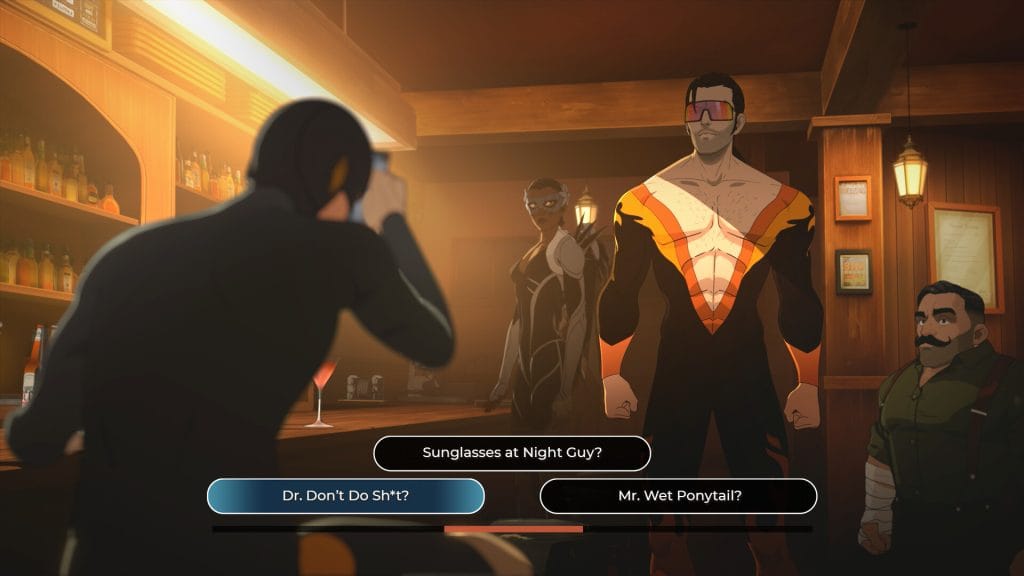
Setting the Stage
Dispatch follows our protagonist Robert Robertson (Aaron Paul) after the ostensible end of his superhero career. A third-generation pilot of an advanced mech suit, Robert is defeated by his arch-nemesis, Shroud, and retires in ignominy after a brutal press conference. It’s only hours later, after intentionally courting some trouble, that he’s approached by the one and only Blonde Blazer. After a series of emotionally-charged and flirtatious conversations, Blonde Blazer reveals her true intentions: to recruit Robert as a dispatcher for SDN, a corporate superhero company that needs dispatchers to allocate and direct its stable of superheroes to the right calls.
After a dramatic opening, Dispatch settles comfortably into its workplace comedy trappings. The setting strikes an honest tone compared to other recent superhero properties — this isn’t The Boys, embodied by cynicism toward power, its corrupting influences, and the world at large. But it also isn’t the MCU’s smorgasbord approach to entertainment, either. The closest touchpoint of existing properties is probably the earliest seasons of Invincible, before the comic and show took on a more space-operatic sense of scope. Superhero work is serious, but there isn’t a premium placed on casualties or horror.
The setting strikes an honest tone compared to other recent superhero properties — this isn’t The Boys.
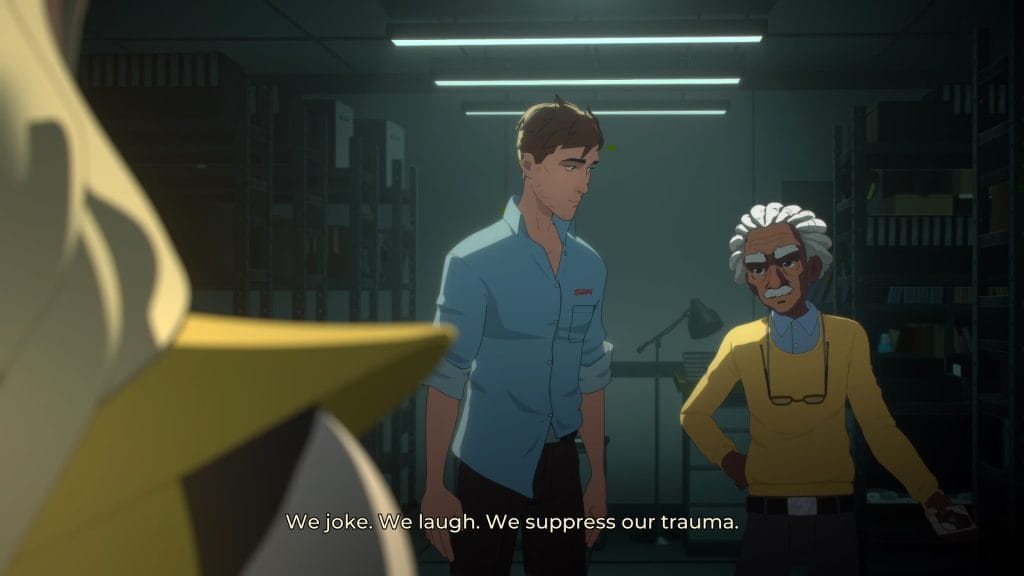
Robert Robertson’s role at SDN becomes clear quickly: Robert and Blonde Blazer must whip up the Z Team — the least respected and most inefficient team at SDN — into shape lest their whole program be binned. Composed of former supervillains that are being rehabilitated into superheroes, this is where most of our star-studded cast comes into play.
Episode 1 does a great job of introducing characters expediently and efficiently, enamoring the player quickly to our lovable (or perhaps not-so-lovable) cast of losers. The banter is quippy but not eye-rolling, and the setting will likely be familiar to millennials who have spent at least some time in the corporate jungle — open cubicles, squeaky office chairs, weird co-workers. The writing here might be off-base to other generations, but it speaks to me as quite accurate.
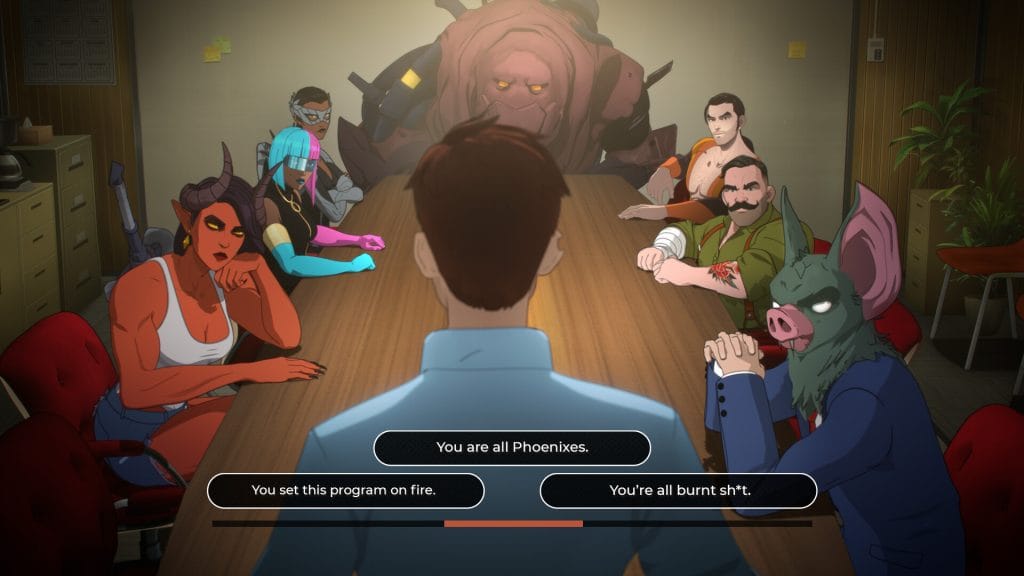
Of note, Dispatch is rated M for mature, so the jokes can be quite crass. There is a real “absolutely ribbing the shit out of your boys” vibe between a pair of the characters and there is copious swearing, sexual innuendo (and tension!), though no gore or excessive violence.
The sharp dialogue benefits from its start-studded cast. Jeffrey Wright and Aaron Paul prove that acting chops transfer across mediums, with their ball-busting banter coming off as natural as can be. Even the “celebrity” additions slot in nicely, even if they’re just acting as themselves — MoistCr1TiKaL’s deadpan delivery in particular delivers some hilarious and punchy jokes.
Episodes 1 and 2 consist of Robert’s backstory, recruitment, and integration into SDN and the Z Team. Because the story is the meat here, I won’t go much further into it other than to say the hook is compelling, the dialogue is sharp, and the characters — at least the ones we are intended to love — are endearing.
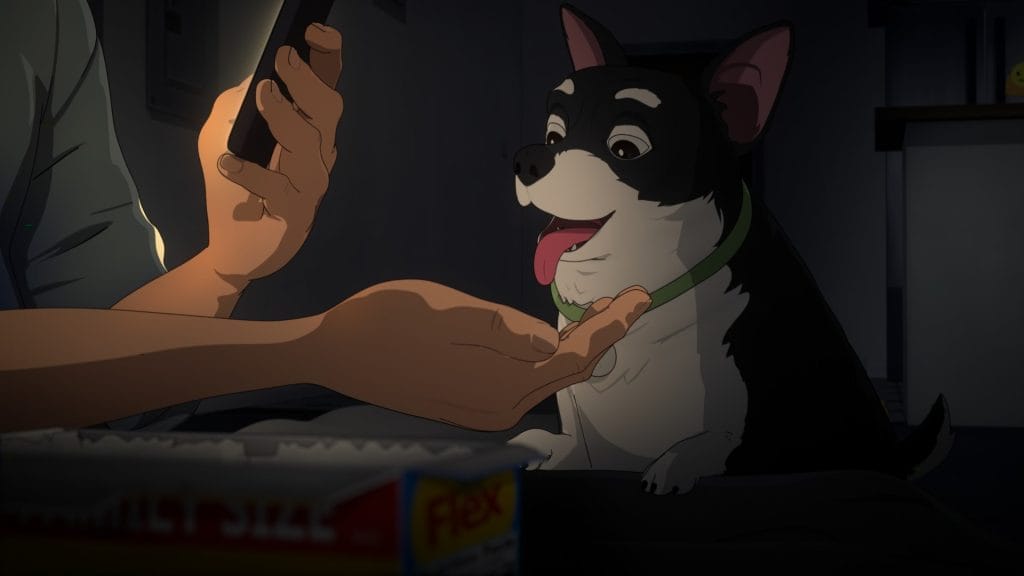
If there’s anything to criticize Dispatch for in its opening act, it’s that it does little to shake the perennial question that plagues Telltale-esque games of its ilk: Will my decisions really matter? I counted a handful of “X will remember that” messages popping up in the top-left corner of my screen, but in its opening hours, Dispatch feels more akin to an enjoyable television show than the peak of Telltale’s ludonarrative experiences. Of course, it’s still early in the process — we’ll see if Episodes 3 through 8 ratchet up the intensity in this regard.
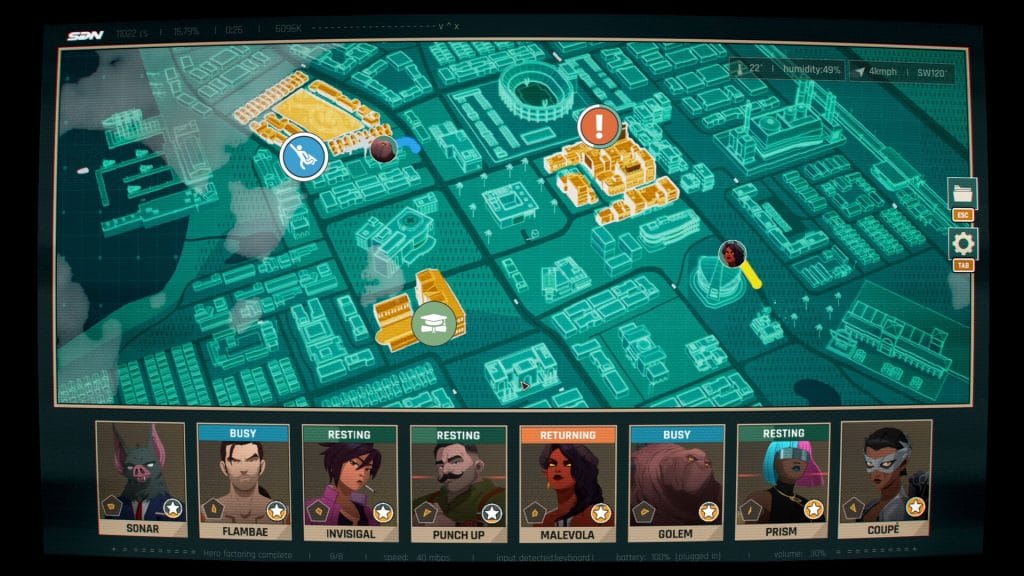
So, There Is A Game Here, Actually
One major difference between the typical Telltale experience and Dispatch is that Dispatch doesn’t actually let you move Robert around to investigate locations or scenes, like you could in Batman: The Telltale Series or other entries. Dispatch is divided into two modes: cutscenes with Telltale’s classic time-limited, three-choice dialogue decision interface and optional quick-time events (QTEs), and the actual dispatching. Sending out superheroes is a sort of real-time strategy game that involves managing individual cooldowns, weighing different strengths and weaknesses, and assessing which heroes to deploy to which scenarios to optimize your chances of success.
Dispatch provides a number of accessibility options, and having played through the episodes on every configuration possible, I do have some recommendations. Disabling the QTEs didn’t appear to have any effect on the outcomes of any scenes, and I personally found that the experience was better to simply turn them off. The animation, acting, and voice delivery is what shines in Dispatch, and it’s easier to focus on those aspects when you aren’t trying to swipe left or right at random intervals. The QTEs aren’t particularly difficult, but they didn’t enhance my experience, either. Also of note is that “do nothing” is never an option, as I found the game defaults you to the rightmost option if you let the timer pass.
The animation, acting, and voice delivery is what shines in Dispatch, and it’s easier to focus on those aspects when you aren’t trying to swipe left or right at random intervals.
The dispatching, on the other hand, is actually quite enjoyable. It’s not Civilization, but managing your roster requires some thought and each hero has their own specific synergy pair (meaning they get bonuses if they are paired with a specific other hero), unique abilities, powers, and so on and so forth that create an engaging system to really plug into.
After the first dispatch section, I was a little worried that the dispatching would become a sort of forced gameplay element that dragged between narrative sections. To my surprise, however, I found myself getting genuinely invested in shaping my roster and aiming for as perfect of a dispatch as I could.
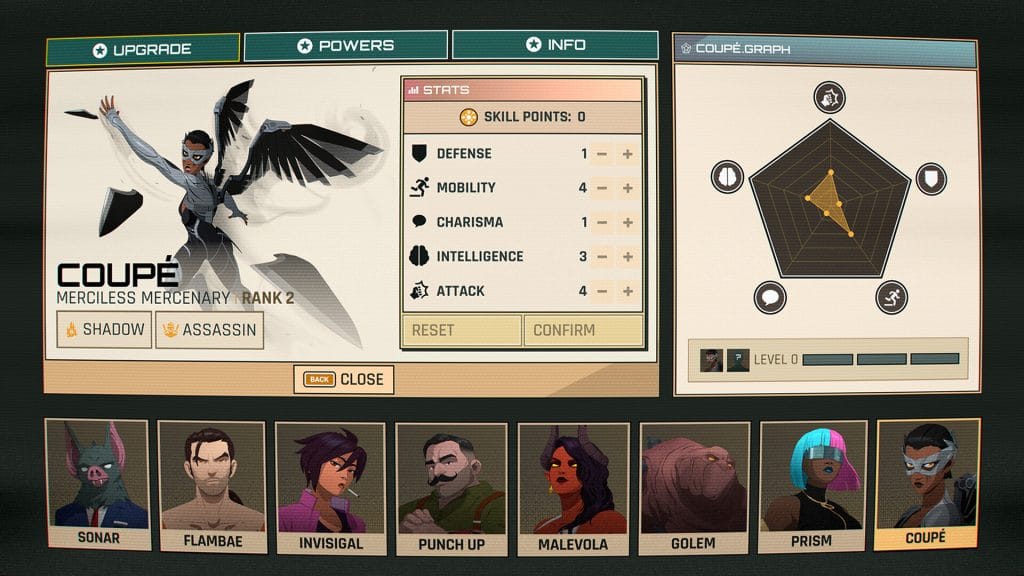
Finally, there is your classic “hacking minigame” that appears during certain missions while on dispatch. You can turn on unlimited hacking attempts in the settings, and I found myself pretty ambivalent on this one. If you don’t want to deal with the stress of failing, it’s totally valid to disable this element entirely, as I don’t think it really adds too much interesting complexity or gameplay value here. That being said, at least at this point in the game, most of the hacking puzzles were quite easy. If I had to give a final recommendation, I’d say turn off interactive QTE cutscenes and turn on unlimited hacking attempts for an experience that balances the narrative while still getting to enjoy the dispatching strategy game.
It’s worth noting that I ran into only one bug over the course of my multiple playthroughs of the first two episodes — a button that typically allows you to finish the dispatch section never appeared, which forced me to redo that dispatch. Thankfully the game auto-saves often, so I only lost 10 minutes of progress. Save-scummers will also be glad to know that there are multiple save slots available, though not an excessive amount, which I think strikes the right balance between letting people experience as much of the game as possible without algorithmically creating a save state for every major decision. I experienced some minor screen tearing here and there, but nothing that hampered my experience significantly.
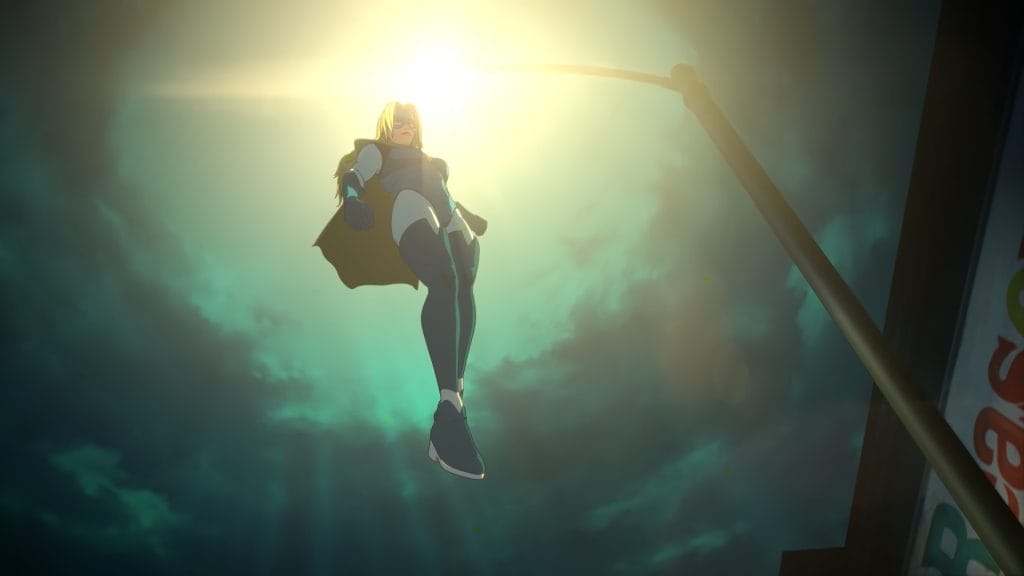
Final Thoughts
AdHoc Studio has created an intriguing premise for a narrative game in Dispatch, a “workplace comedy” in a novel setting. Buoyed by a stellar cast that strikes just the right balance of “aha, so that’s who that is” in its celebrity status with powerful performances from its heavyweights, the first two episodes of Dispatch left me thoroughly wanting more.
While Dispatch does lack some of the freedom of prior Telltale experiences (at least thus far), the quality of the narrative and presentation is enough to get me hooked for now. I’m eagerly anticipating Episodes 3 and 4, and I can’t wait to share my thoughts on them with you all soon. In the meantime, if a lower-stakes, more comedic narrative experience in a superhero world speaks to you, Dispatch is worth checking out.
Score: 8.0/10
Dispatch, developed and published by AdHoc Studio, is scheduled to release across eight episodes. Two new episodes release each week, starting with Episodes 1 and 2 on October 22, 2025, and finishing with Episodes 7 and 8 on November 12, 2025. The game is available on PC (via Steam) and PlayStation 5. MRSP: $29.99 (includes all eight episodes). Version reviewed: PC.
Disclaimer: A review code was provided by the publisher.
Huge video game, comic book, and anime fan. Spends way too much time watching things he doesn’t like. Hates Zack Snyder. Mains Falco.


